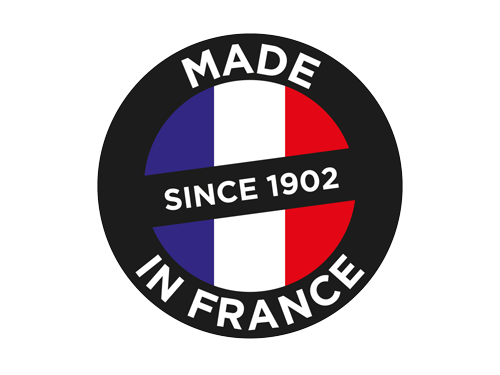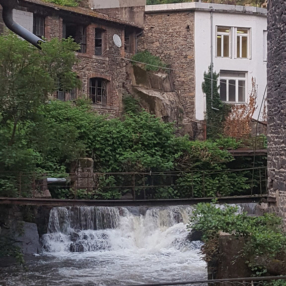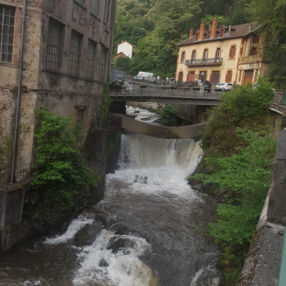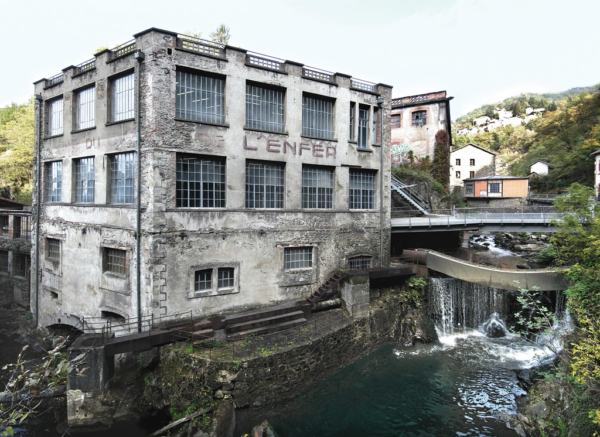
We are in the middle of the 19th century and the cutlery industry is in full swing. At that time, the cutlery business occupies 25,000 people. In the valley, the factories beat the iron and the spinning wheels sharpen the blades. In the city, we assemble, polish, trade, repair … Thiers and its surroundings live and breathe knives all day long. One of the specificities of cutlery in Thiers is the manufacture of regional knives, the most famous is the Laguiole (named after a village in Aveyron).
However, nothing predestined Thiers to this specialization. There are no iron or steel mines or sandstone quarries on the site. But there is the forceful river Durolle, whose hydraulic force will provide the energy needed mills and factories cutlers. Not to mention the tremendous obstinacy and motivation of a population occupying a difficult and steep territory. Moreover, from the 17th century, the knives made in Thiers were exported from the ports of Bordeaux and Nantes, via Spain and Italy, to the Levant. But it is truly in the nineteenth century that cutlery will grow phenomenally.
Built along the banks of the Durolle, in what is now known as «Vallée des Usines” also called “Le Creux de l’Enfer”, the workshops take full advantage of the energy provided by the river to produce and supply massively the hardware stores wholesalers from France and Navarre. And this, thanks to a successful organization of work, based on fragmentation: the work is split between a multitude of workshops that only perform a stage of manufacture. So there are as many trades as stages of making a knife. This is work at home governed by a specific collective agreement.
It is here, in the heart of one of these spinning wheels that a certain Blaise Dozorme starts his professional activity as a grinder. Nicknamed “the wolf” by his peers, he acquires an invaluable know-how in the treatment of steel and grind. Taking advantage of this expertise acquired over time, he decided to install a small cutlery workshop in his house. We are then in 1902, the Dozorme cutlery was born…
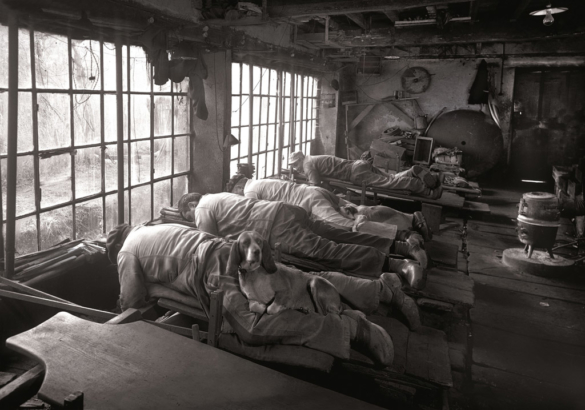 « At Creux de l’Enfer, one of the spinning wheels where Blaise Dozorme learned the job of grinder » a Dozorme’s picture.
« At Creux de l’Enfer, one of the spinning wheels where Blaise Dozorme learned the job of grinder » a Dozorme’s picture.
Local memory still remembers the “yellow bellies”, these hundreds of grinders (who give their edge to the blades) lying side by side on the belly above the wheels with their dogs lying on the legs to warm them up. This specific position to the French cutlery business allowed them to support the blade on the sandstone wheel to give it its first edge. A position far from comfortable but certainly the most stable to perform this crucial step in the manufacture of a knife. It must be remembered that the grinder has a primary role and his work is certainly the most prestigious in the production line of a knife. Indeed, this step of grinding the blade to refine it will determine the longevity and quality of the cutting edge of the future blade, the quality of its cut and the ability to rebuild the knife several times after use!
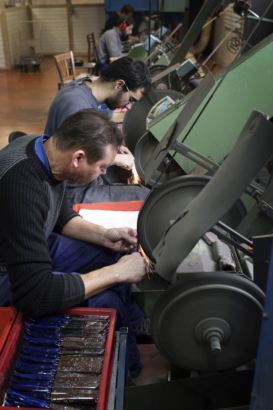 Today, “grind” is always done with great care but is performed in a vertical position, a much more comfortable posture or numerically with high precision equipment.
Today, “grind” is always done with great care but is performed in a vertical position, a much more comfortable posture or numerically with high precision equipment.
The Claude Dozorme factory has fully integrated this crucial step by equipping itself with a state-of-the-art, high-performance emulsion machine equipped with digital sensors that measure the wear of the grinding wheel and reposition it in order to obtain an excessively precise and constant grinding on all the blades Claude Dozorme. This is one of the reasons why the pocket knives, table knives and kitchen knives produced by the family factory offer perfect cutting quality.
Photo : The grind of Claude Dozorme’s knives, nowadays








